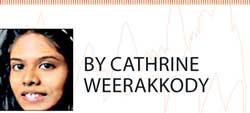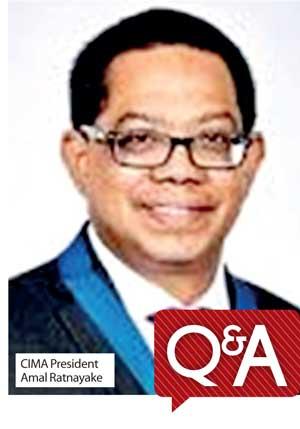19 Mar 2020 - {{hitsCtrl.values.hits}}
 Canadian finance leader Amal Ratnayake, FCMA, CGMA, the 86th President of the Chartered Institute of Management Accountants (CIMA), says organisations can no longer rely on traditional business models to succeed and need to rethink everything from their product and service offerings to their talent management strategy. In May, Ratnayake was also confirmed as Chairman of the Association of International Certified Professional Accountants, the global accounting organisation formed by CIMA and American Institute of CPAs (AICPA), to advance the accounting profession worldwide. As CIMA President, Ratnayake will represent 228,000 members and students across the world.
Canadian finance leader Amal Ratnayake, FCMA, CGMA, the 86th President of the Chartered Institute of Management Accountants (CIMA), says organisations can no longer rely on traditional business models to succeed and need to rethink everything from their product and service offerings to their talent management strategy. In May, Ratnayake was also confirmed as Chairman of the Association of International Certified Professional Accountants, the global accounting organisation formed by CIMA and American Institute of CPAs (AICPA), to advance the accounting profession worldwide. As CIMA President, Ratnayake will represent 228,000 members and students across the world.
Excerpts from the interview:
You are the first Sri Lankan citizen to become President of CIMA Worldwide. How big is CIMA in Sri Lanka and how important is Sri Lanka to CIMA?
CIMA has strong historic connections with Sri Lanka that go back over 50 years and has long had members from the country serving on the CIMA Governing Council. I am, in fact, the second Sri Lankan-born person to take the office of CIMA President. Aubrey Joachim, who was elected as President of CIMA in 2009, was the first.
It shows how CIMA has evolved to become a truly global organisation since its formation in 1919 and one that connects like-minded business and finance professionals across the world and across Sri Lanka. Having been born and brought up in Sri Lanka, I am proud of the success of the organisation here.
The country can boast the largest number of CIMA members outside of the UK. We currently have nearly 5,000 members and over 10,000 students in the country and we go from strength to strength, promoting the profession locally.
Many members are the movers and shakers in business and finance, working in a range of roles – from graduate finance roles to CFOs – for a wide number of private and public organisations, including MAS, the Central Bank of Sri Lanka, JKH, DFCC Bank, HSBC, KPMG, EY and more.
What is the range of benefits and services available to CGMA designation holders, to keep them at the forefront of their profession?
Our members and students have been at the heart of everything we do for over 100 years. We work hard every day to provide them with what they need to stay employable, ethical and competent in this era of accelerating technological disruption and changing business models.
Our qualifications test the competencies required by employers, we release new research on business and finance issues, support an online global jobs and careers portal, provide access to over 3000 professional development courses and offer networking events to equip members and students with the skills demanded
by businesses.
Besides that, we also work closely with employers, politicians, policymakers and regulators across the world to drive recognition of the enormous value the Chartered Global Management Accountant (CGMA) designation holders bring to businesses and society as a whole.
And through CIMA’s work with the American Institute of CPAs (AICPA) to form the Association of International Certified Professional Accountants, we now have the combined strength to support our members’ professional needs, develop new offerings and provide the very best and latest resources to accountants and finance professionals across the world.
What professional development resources, skills and support does CIMA provide?
We are always committed to support our members and students, so we try to come up with multiple resources that can continuously support their career and learning journey with CIMA. Some of them would be the latest research information, thought leadership reports, global careers hub I just mentioned and a library of leading-edge resources to help them stay ahead of the pack.
It also includes and provides the insights needed to succeed in a digital age, analysis on the future of the profession and guidance on changing skills that is crucial for the new world of finance. The CIMA Professional Qualification is therefore a future-embracing syllabus that focuses extensively on finance for the digital world.
CIMA is a trendsetter in Islamic finance. How does CIMA differentiate itself from the other accounting bodies?
Islamic financing instruments are seen as an alternative to traditional financing instruments and is a fast-growing sector of the global finance market, which creates new opportunities for finance professionals. So, the need for competent professionals in this area to meet market demand is higher than ever.
Our award-winning Islamic finance qualifications provide a thorough understanding of the principles that underpin Islamic finance and give finance professionals a distinct set of skills and specialist knowledge and help them thrive in the business world.
Generally speaking, employers are now seeking finance professionals that can work effectively with business partners across the organisation to create and sustain value creation. Our programmes are designed to do just that and are recognised around the world as the most relevant finance programme for professionals seeking a career in business, bringing together management accounting, financial accounting and business skills.
How do you position CIMA members/CGMA designation holders as boardroom candidates?
CIMA has a strong track record for producing competent management accounting professionals, who can guide and lead their organisations to sustainable success. In fact, a number of CGMA designation holders lead some of the most respected organisations of Sri Lanka, such as MAS Holdings, Hatton National Bank, Dialog Axiata PLC and Commercial Bank.
Employers nowadays need employees that encompass the right competencies and skills in this tech-led business world, such as digital business models, cyber risks, data analytics and emerging technologies. Using our resources and materials, students and members are encouraged to develop a growth mindset so that they can readily adapt, learn new skills and remain attractive to employer needs and become future leaders.
Professions such as accounting could be pushed to the brink of extinction as developments in technology make roles redundant. How would you ensure CIMA members/CGMA designation holders stay relevant and current?
As well as a strong technical understanding, today’s management accountants need to become business influencers and storytellers, who provide foresight to business partners and aid the corporate decision-making process. They need to enhance their social as well as commercial skills.
Our Future of Finance research programme findings concluded having technical accounting knowledge is no longer enough for finance professionals to succeed in the modern business world. Over the last 12 months, we have provided new resources needed to broaden the members’ digital skills, providing access to free development courses on areas such as artificial intelligence, blockchain and data analytics.
Finally, what are the changes that you are making to the CIMA qualification to meet the future needs of businesses and employers globally in a digital world?
The world is moving at an unprecedented pace – and accelerating every day. New and emerging technologies, demographic shifts, market upheaval and evolving consumer expectations are transforming the business world impacting every industry, every sector and every business function. Organisations can no longer rely on traditional business models to succeed and need to rethink everything from their product and service offerings to their performance management processes and talent management strategy.
In this context, finance professionals must move fast to thoughtfully reimagine what they do and how they do it or risk being left behind. As a professional body, it is our role to help them navigate these unfamiliar times.
This is why in January 2019, we launched our enhanced CIMA Professional Qualification, driven by the findings of our extensive and rigorous research programme into the future of finance. Over the course of 18 months, we consulted with over 5,500 finance professionals from over 2,000 public and private organisations in over 150 countries to build a composite picture of the role finance professionals play in business, identify competencies and skills employers expect to drive finance transformation and map how these are changing in a digital world.
The updated CIMA Professional Qualification therefore covers all the competencies and skills employers expect in a tech-led business world. These updates continue to ensure that we continue to help finance professionals – like we have done for the past 100 years – reach their full potential.
We are supporting them to become global, multi-skilled, dynamic experts, who constantly learn, unlearn and relearn new skills, to harness the full power of technology and create organisational value in an increasingly complex environment.
(Cathrine Weerakkody, a graduate in financial analysis and an Associate of CIMA, has a Master’s Degree in Financial Management and is currently reading for a PhD in England)
27 Dec 2024 13 minute ago
27 Dec 2024 2 hours ago
27 Dec 2024 3 hours ago
27 Dec 2024 3 hours ago
27 Dec 2024 3 hours ago